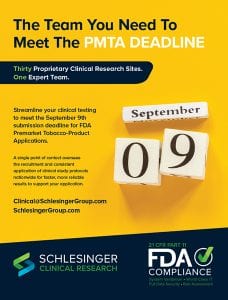
Are vapers at a higher risk of contracting Covid-19?
By Maria Verven
While there’s little doubt that a history of smoking poses a higher risk of serious consequences for those who contract Covid-19, the risks are less well known for vapers.
We simply don’t have enough data on Covid-19 and vaping… yet. While e-cigarette use is popular among younger people, it’s much less prevalent among older adults who are more likely to visit a hospital with Covid-19, where data such as age, smoking and/or vaping history as well as underlying health conditions can be captured and examined for trends.
Clearly, a key mitigating factor is the relatively low rate of e-cigarette use. In China, the epicenter of Covid-19, a 2018 survey of 10,233 individuals in five cities found that only 0.9 percent had used e-cigarettes within the past 30 days.
In the U.S., only 1 percent of those over 65 years reported they currently used e-cigarettes of the 32,931 adults who completed the 2016 National Health Interview Survey. Less than 1 percent of adults over age 65 responded “Yes” when asked, “Have you smoked any e-cigarettes or ‘vaped’ in the past week?” in a more recent Gallup Poll conducted last October.
Another issue is that most vapers switched after years of smoking, where the links between Covid severity are much clearer.
Short of any evidence linking e-cigarette use and Covid severity, both the World Health Organization (WHO) and the Food and Drug Administration (FDA) walked back previous unsubstantiated statements that spread fear and confusion and set off alarm bells in the vaping community.
While scientists continue to study the data and come up with hypotheses about who is most at risk of serious Covid consequences, public health agencies are singing the same old song encouraging people to quit both smoking and vaping.
As always, the truth will eventually come to light.
Smoking and Covid-19: clear links
The most recent analysis of data by researchers at the University of California in San Francisco (UCSF) found that smoking significantly worsens Covid-19.
The study, published in the May issue of Nicotine & Tobacco Research, included 11,590 Covid patients hospitalized in China, Korea and the U.S. The researchers found that the risk of more serious consequences and death nearly doubled if the patient was a current or even a former smoker.
Smoking increases the risk and severity of pulmonary infections in general, although until this study, the correlation between smoking and Covid-19 were less clear. However, this data corroborates previous research showing that smokers ran a higher risk of infection and mortality from a different coronavirus, MERS-COV.
The researchers examined 19 peer-reviewed scientific papers published before April 2020 in PubMed. Of the 11,590 patients, around 30 percent of smokers experienced “disease progression” compared with around 18 percent of non-smoking patients.
The WHO warns smokers of the risks of serious Covid-19 consequences in a Q&A on its website: “Available research suggests that smokers are at higher risk of developing severe Covid-19 outcomes and death. Covid-19 is an infectious disease that primarily attacks the lungs. Smoking impairs lung function, making it harder for the body to fight off coronaviruses and other respiratory diseases.”
However, the WHO stops short of warning vapers that they run the same risks: “There is no evidence about the relationship between e-cigarette use and Covid-19.”
FDA stance elicits swift rebuttal
While warning that smoking cigarettes appears to increase the risks of serious complications and consequences from Covid-19, the FDA admits there’s no evidence showing that vapers are at higher risk.
“E-cigarette use can expose the lungs to toxic chemicals, but whether those exposures increase the risk of Covid-19 is not known,” the FDA wrote in an emailed statement to Bloomberg News after the media outlet ran a story on March 27 with the headline, “Vaping could compound health risks tied to virus, FDA says.”
The article evoked a quick response from a large cadre of distinguished doctors, scientists, professors and policy experts from the U.S., Canada, the U.K. and Greece.
Their letter to the FDA severely critiqued its stance on Covid-19 and vaping, and asserted three important points regarding the 12 million vapers and 34 million smokers in the U.S.:
1. Advice should be validated for veracity: “If the federal government is going to provide advice, it should be available via FDA and CDC websites, validated for its veracity and clarity, tested for unintended consequences, and made widely available through recognized and trusted health professionals.”
2. There’s no evidence on vaping and Covid-19: “Many older adult vapers will have underlying conditions… through many years of smoking… that increase their vulnerability and likelihood of severe or fatal Covid-19 symptoms. We know of no relevant and informative evidence on vaping and Covid-19 and the evidence on smoking and Covid-19 is inconclusive and contradictory.”
3. Pronounced differences in risk between smoking and vaping: “We believe that advice to smokers should be consistent with the longstanding public health imperative to quit smoking using whatever methods work, and that includes by switching to vaping.”
In conclusion, the authors wrote, “It is important that the FDA does not assert or imply an equivalence in risk between smoking and vaping.”
Ultimately, they raised two critical questions: “On what basis is the FDA confident that it is right to discourage people with underlying smoking-related conditions from vaping at this time, given the likely alternative for many is a return to smoking?”
And, “Where is the evidence-based reasoning that advising adult smokers against vaping is appropriate for the protection of public health at any time, but especially during this Covid-19 crisis?”
This isn’t the only snafu the agency has faced.
When people started coming down with a mysterious lung illness last summer, it took months for the FDA and the Centers for Disease Control and Prevention (CDC) to finally acknowledge that THC cartridges, most likely tainted with vitamin E acetate were to blame—and not legal e-liquids.
But by the time they finally connected the obvious dots, the damage was already done. News stories that blamed deaths on “vaping” delivered a major setback to the vaping industry, potentially scaring away vapers and anyone even remotely interested in switching to vaping.
In one silver lining, the pandemic prompted the agency to delay its original May 12 deadline for companies to submit their premarket tobacco applications (PMTA) for vaping products until Sept. 9. This could come as a relief for many companies that were scrambling to meet the May deadline, although the postponement is unlikely to help those who weren’t prepared for the original due date.

Still a better option
“To date, there is no conclusive and clear data on the effects of electronic cigarettes on cardiovascular and general health, especially from a longitudinal perspective,” wrote the authors of an article on e-cigarettes and cardiovascular risk published December 2019 on the National Institutes of Health website.
“While waiting for more evidence, it seems reasonable to consider electronic cigarettes as a better option when compared with conventional tobacco products, but at the same time it should be fairly obvious that no smoke is better than electronic smoke,” the authors concluded.
There’s even a hypothesis that nicotine, which has anti-inflammatory properties, may benefit patients with Covid-19 by preventing the immune system to overreact.
Konstantinos Farsalinos, a cardiologist, clinical researcher with the Onassis Cardiac Surgery Center in Athens and expert on e-cigarettes, noticed that very few Covid-19 patients hospitalized in China were smokers, even though about half of Chinese men smoke.
In a paper published in May 2020 in the European Respiratory Journal, Farsalinos and his colleagues walked a fine line on the question of whether smoking reduces or increases the risk of contracting Covid-19.
“Through analysis of the pooled prevalence of current smoking across 11 case series determined that current smoking status was significantly lower than expected gender and age-adjusted prevalence in Covid-19 patients,” the authors wrote.
“While we do not dispute that the prevalence of smoking in Covid-19 cases has been surprisingly low across the world, we would echo the World Health Organization’s advice based on emerging evidence that outcomes in Covid-19 are worse in patients who do smoke.”
Difficulties in obtaining vape supplies
At least one thing is known: the chances that e-liquids or devices could transmit Covid-19 are slim to none, according to experts in microbiology and immunology. While the virus may be able to live on surfaces for two to three days, by the time the products arrive in the U.S., the possibility of contamination is virtually nil.
However, it’s already becoming apparent that Covid-19 may interrupt the vaping supply chain, as most of the the world’s vaping and e-cigarette hardware is produced in Shenzhen, China. While larger vaping companies such as JUUL Labs that have facilities in Shenzhen, may be able to weather the storm, small- and medium-size businesses may experience shortages in hardware, coils and other vaping supplies.
The supply chain is only one in a perfect storm of issues surrounding the industry. Many of these issues are coming to a head in the U.S., which continues to ban flavored vaping products, fuel hysteria over teenage vaping and pass prohibition laws in some counties and states.
In January, the Trump Administration announced that it would prohibit the sale of flavored e-cigarette products except tobacco and menthol in the U.S. Fortunately, the new policy applies only to cartridge-based e-cigarette products made by JUUL Labs and other companies, which are more popular with youth. Refillable, tank-style e-cigarette that are primarily sold in age-restricted vape shops are exempt.
And the new policy is less draconian than the original plan, which was to remove all flavored vaping products, even menthol, from the market until they received FDA clearance.
The state of New York recently passed a new measure prohibiting the sale of tobacco and vaping products in pharmacies, banning all online sales, and restricting vape shops from selling anything but tobacco flavored e-liquids.
And while “essential” services such as convenience stores, pharmacies and gas stations have been allowed to remain open during state-wide shutdowns, vape shops have not been allowed to remain open. So it’s much easier to buy traditional cigarettes than e-cigarettes, e-liquids and vaping supplies, much to the chagrin of both vape shop owners and their customers.
Other countries have deemed vape shops as essential even in pandemic hot spots such as Italy and Spain, France and Switzerland. However, the U.K. has also forced vape shops to close, despite their stance that vaping is a safer alternative to smoking.
Life-saving advice
Vaping devices should be in the same category as nicotine replacement products, like patches or gums, maintained Michael Siegel, a Boston University School of Public Health professor with more than 30 years’ experience in tobacco control including two years at the CDC’s Office on Smoking and Health. “It would make sense to treat them in a similar way to pharmacies,” he said.
“While there is no question that smoking puts individuals at greater risk of serious consequences from Covid-19, it is plausible, but not proven yet, that vaping—which can cause mild, acute respiratory irritation and inflammation—could also impair the respiratory system’s ability to fight off Covid-19 infection,” Siegel said.
“However, any impairment caused by vaping is certainly much less than that caused by smoking. Most importantly, our advice to the public does not really change regardless: If you smoke, it is urgent that you quit. If you can’t quit cold turkey or using FDA-approved medications, then switching to vaping is absolutely indicated and could be lifesaving,” Siegel said.
The original “Vaping Vamp,” Maria Verven owns Verve Communications, a PR and marketing firm specializing in the vapor industry.

